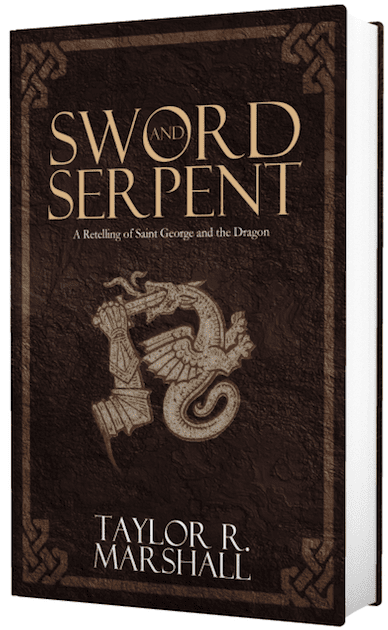[…] Is a Martyr – Super Martyrio New Year’s Dreams – Abigail C. Reimel, Ignitum Today Sword & Serpent: An Interview w/ Dr. Taylor Marshall – Sam […]
A blog for Catholic men that seeks to encourage virtue, the pursuit of holiness and the art of true masculinity.
Sword and Serpent: An Interview with Dr. Taylor Marshall

If there’s a modern renaissance man, it’s Dr. Taylor Marshall. He’s the founder of the wildly successful New Saint Thomas Institute, the founder of the Catholic organization the Troops of St. George, a professor, a best-selling author, a popular blogger, an in-demand speaker, a gentleman extraordinaire, and a P.h. D in Philosophy, among other things. Oh yeah, he’s also the proud father of 7 kids.
While Dr. Marshall has accomplished many things, there’s one thing he had not done until very recently: Write a novel. Finally, he can check that goal off his bucket list. Dr. Marshall has just released his debut novel, Sword and Serpent, a re-telling of the ancient story of St. George and the dragon. Already, the book is a runaway success, debuting at number one on Amazon for its category. It’s extremely well rated too, with readers saying things like, “This book is absolutely splendid,” and “I couldn’t put this book down.”
Recently, Dr. Marshall and I sat down to discuss Sword and Serpent and some of the challenges presented in writing a fiction work.
1. You’ve written a number of successful non-fiction books. What made you want to write a novel?
I love writing theology and philosophy, but my heart is in fiction. Our Lord, for the most part, did not give us bullet point lists of the systematic theology. Instead, He told fictional parables to illustrate profound theological principles. Stories are the most powerful theological medium, so long as they aren’t overly preachy or obvious.
2. You founded a Catholic boys organization known as the Troops of St. George. Now you’ve written a novel about him. What is compelling to you about the story of Saint George?
Saint George is an exemplar for our own time. Plus, the iconography of Saint George with the dragon legend is just too irresistible. It’s something that resonates with everyone. We all must slay our dragons.
3. Many modern Catholics are somewhat turned off by the idea of a soldier-saint. Is there room for warrior saints? What can they teach us?
He was a soldier. He was a man. Moreover, he was a martyr under the tyranny of the Emperor Diocletian. He reveals Catholicism in the public square and I like that. We need models of masculinity in the face of political injustice.
4. The book is geared toward young adults. What made you want to target this specific audience?
Literature and entertainment for young people is becoming so crass and sexualized. I wanted to provide something that was fun, adventurous, but also noble. This novel Sword and Serpent is just that.
5. Can you tell us a little bit about the plot? (No spoilers of course)
Sword and Serpent starts in AD 299 in the Roman Empire. It follows a young man who will become Saint George. Along the way, he meets other historical characters like Saint Nicholas, Saint Blaise, and Saint Christopher. He learns of a prophecy that places him at the center of activity in the Roman empire. His mission ultimately ends with a dragon…but in this story the dragon is not exactly what you might expect.
6. Novel writing is notoriously difficult. What challenges did you face writing a novel? What was the most rewarding part?
Fiction is much harder than non-fiction. The primary difference for me is that my heart is this novel more so than in my theological books. There’s a vulnerability to writing something creative.
7. During the writing process, did any character become especially meaningful to you? If so, why?
I love Jurian, who is the Saint George character. I also love Nikolaos, who is Saint Nicholas. He bilocates and works miracles. He’s like an ancient Padre Pio this novel.
8. The book debuted at #1 in its genre on Amazon. That’s a huge success! Do you have any plans for future novels?
Yes, the second book, a sequel is already in the works.
9. There’s a lot of fiction out there, but Catholic fiction has dwindled in recent decades. Do you hope to see a renaissance in Catholic fiction writing?
I hope so. The danger with “Catholic fiction” is that it feels overtly Catholic or preachy. Solid fiction always sneaks up on you. My hope is that non-Catholics and even non-theists could read Sword and Serpent and enjoy it…and be challenged by it.
10. If you could give readers one reason to buy Sword and Serpent, what would it be?
The number one reason to get it is that it’s fun and exciting to read. It’s solid, clean entertainment. The number two reason is that you’ll subliminally pick up a lot of Catholic/sacramental theology if you read between the lines.
Convinced? Pick up a copy of Sword and Serpent here.
The Troops of St. George aren’t “scouting” let alone “Catholic scouting”.
I agree: the Troops of St. George group is not related to the BSA group and is in fact completely different in the purposes that they each strive for. Troops of St. George is a group where my boys are learning outdoor skills, virtues and leadership all under a Catholic teaching.
I didn’t have the BSA in mind when I referred to “scouting” but rather the educational method developed by Lord Baden-Powell. It is this standard that the Troops of St. George don’t meet.
Any chance this being made into a audiobook?